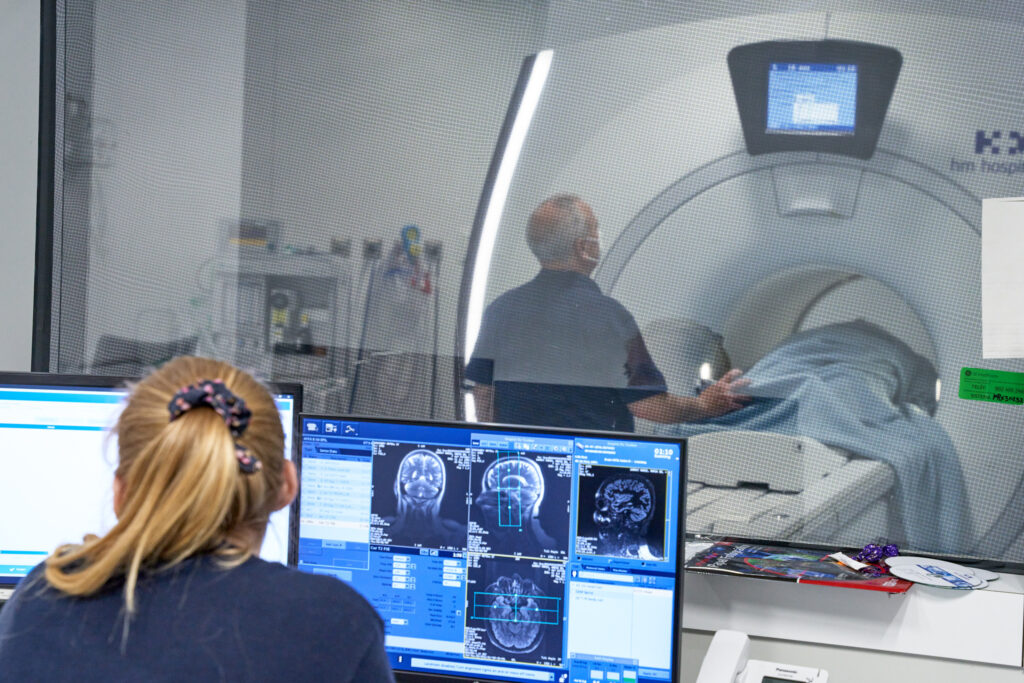MRI with specific software
What is MRI with specific software?
Magnetic Resonance Imaging (MRI) with specific software refers to the use of specialized computer programs that complement MRI image acquisition to improve the diagnosis, treatment planning, and monitoring of various diseases. These programs allow for more detailed analysis of images, quantification of different parameters, and more precise visualization of anatomical structures.
What is this diagnostic test used for?
MRI with specific software is used for a wide variety of purposes, including:
- Improved diagnosis: Allows for detecting subtle lesions that might go unnoticed in conventional MRI images.
- Quantification of parameters: Allows for quantifying different parameters, such as the volume of a structure, signal intensity, or blood flow, which provides objective information for diagnosis and disease monitoring.
- Treatment planning: Facilitates treatment planning by providing detailed information about the anatomy and extent of the disease.
- Monitoring treatment response: Allows for monitoring treatment response, evaluating changes in quantified parameters over time.
- Research: Used in research to study the functioning of the brain and other parts of the body.
Benefits of high technology in MRI with specific software
MRI with specific software offers a series of key benefits thanks to the technology it uses:
- Greater diagnostic precision: Allows for a more precise and earlier diagnosis of various diseases.
- Objective information: Provides objective and quantifiable information that can be used to monitor disease progression and treatment response.
- Personalized treatment: Facilitates personalized treatment, allowing treatment to be adapted to the individual characteristics of each patient.
- Improved quality of life: Can improve the quality of life of our patients by allowing earlier diagnosis and more effective treatment.

How is the procedure performed?
The MRI procedure with specific software is similar to that of a conventional MRI:
-
Preparation:
You will be asked to remove all metallic objects (jewelry, piercings, etc.) from your body. It is important to inform your doctor if you have metallic implants in your body, such as pacemakers or cochlear implants.
-
During the test:
You will lie on a table that slides into the MRI scanner. A coil will be placed on your head or the area of the body to be scanned. You will be asked to remain still during image acquisition. In some cases, an intravenous contrast medium may be administered to improve the visualization of anatomical structures.
-
After the test:
You can resume your usual activities immediately after the procedure.
The main difference from a conventional MRI is that the acquired images will subsequently be processed with specific software to obtain additional information.
Recommendations for the test
Remember that it is important to follow these recommendations to ensure the quality of the study and your comfort:
- Inform about metallic implants: It is crucial to inform medical staff if you have metallic implants in your body, such as pacemakers or cochlear implants.
- Remain still: It is important to remain calm during image acquisition to prevent blurred images.
- Follow instructions: Carefully follow the instructions provided by the MRI technician.
Are there any risks?
MRI with specific software is generally safe, but like any medical procedure, it has some minimal risks to consider:
- Claustrophobia: Some people may experience claustrophobia while inside the MRI scanner.
- Noise: The MRI scanner produces a loud noise that can be bothersome for some people. You will be provided with earplugs or headphones to reduce the noise.
- Allergic reactions: In rare cases, allergic reactions to the contrast medium used in some MRI studies may occur.
For your test to proceed smoothly, we ask that you arrive in advance of your scheduled time. This will allow us to complete the necessary administrative and clinical preparation.
Before the test, we will provide you with the Informed Consent form, a document with important information that you must read and sign.
If your appointment is for a Magnetic Resonance Imaging (MRI), it is crucial that you inform us about the presence of pacemakers, metallic objects, prostheses (including dental), tattoos, or medication infusion devices, such as insulin pumps.
These diagnostic tests are very safe, but as with any medical procedure, there is a minimal possibility of incidence.